Should Attorneys Accept The New Wave of A.I. Jurors?
The Terminator, I, Robot, and Wall-E—three iconic films, each presenting a captivating vision of a machine-learning future at the time of their release. These cinematic explorations of artificial intelligence left audiences wondering how far such technologies could evolve. Yet, could any of us have anticipated AI progressing to the point of potentially replacing human jurors?
Recently, the legal world has been abuzz with debate over the emergence of jury simulators—AI systems designed to replicate the thought processes and emotional responses of real jurors. While some celebrate this as a groundbreaking advancement in technology, others express serious concerns about the implications of replacing human judgment with AI in matters of law and justice.
In a recent survey, LegalTech Research Group reports that 82% of legal professionals who utilized AI-simulated juries observed notable shifts in trial outcomes. However, not everyone is convinced. Gina Esfandi, an associate attorney and manager of litigation operations at Abir Cohen Treyzon Salo, LLP, argues that AI should play a supporting role in the legal field, not the starring one.
Beyond concerns over the appropriateness of AI in jury simulation, ethical and privacy issues loom large. With vast amounts of data being uploaded and analyzed, questions arise about accountability in the event of a data breach. Would responsibility lie with the AI production company? The client? And with most attorneys lacking expertise in computer science or artificial intelligence, the risk of misapplication and personalization issues remains a pressing challenge.
Although jury simulation divides opinions, there’s no denying that AI is delivering transformative benefits in other areas of the legal field. For example, FGA Research leverages cutting-edge AI algorithms to analyze data for both online and in-person projects. These innovations empower trial attorneys with actionable insights to refine their cases and elevate their strategies.
We’re eager to hear your thoughts:
Do you believe attorneys should embrace the wave of AI jurors? Or should AI remain a tool for specific aspects of legal research, as we do at FGA Research?


